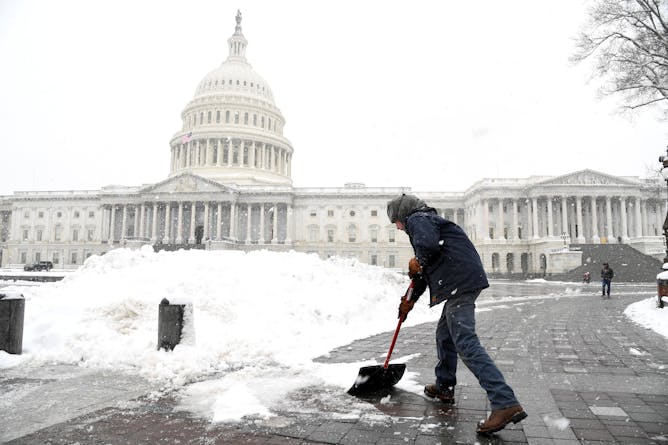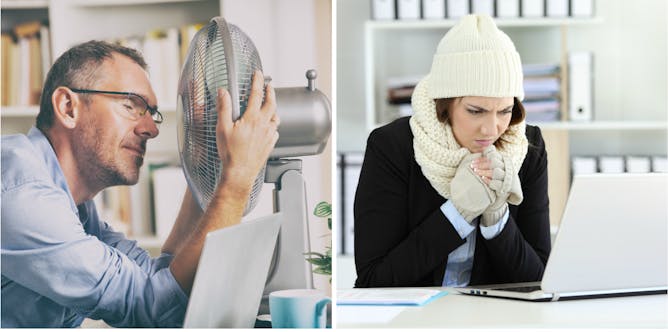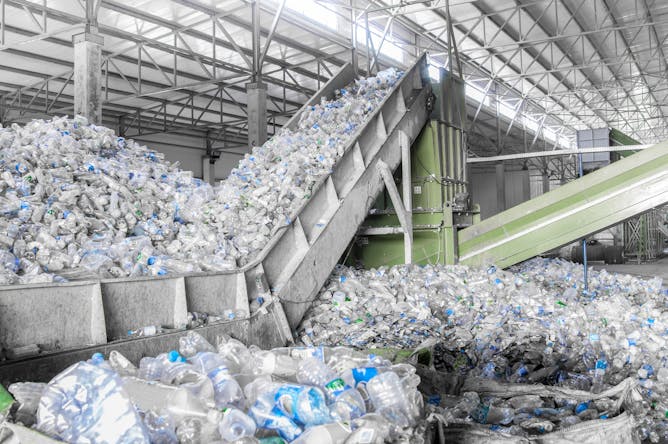|
|
|
Editor's note
|
|
The partial government shutdown is now the longest on record. American University’s Morten Wendelbo writes that forests aren’t being managed for wildfires, hurricane forecasters are furloughed, and first responders aren’t doing their usual off-season training. The result could be more exposure to danger in the future.
It’s winter, so you’re probably cold in the office – unless you’re too warm. A research team at the University of Michigan is working on a system that may end the struggle over the office thermostat. The system would not just let everyone gripe about a room’s temperature in real time, but actually sense the group’s optimum temperature and heat or cool the room appropriately.
With all those blue recycling bins around, you might think Americans are experts at recycling plastics. The truth is, though many plastic items can be recycled, very few are. So what’s the solution? Margaret Sobkowicz, a plastics engineer at the University of Massachusetts Lowell, explains how we can scale up plastics recycling.
|
Aviva Rutkin
Big Data + Applied Mathematics Editor
|

|
|
Top stories
|

Aaron Rowe of the Architect of the Capitol’s office, which is not affected by the partial government shutdown, shovels snow left by a winter storm on the U.S. Capitol’s plaza.
REUTERS/Mike Theiler
Morten Wendelbo, American University School of Public Affairs
The shutdown poses a very real threat to preparedness for future emergencies, such as natural disasters and disease outbreaks.
|

Someone’s too hot and someone’s too cold.
Collage by The Conversation, combining images by Monika Wisniewska and Antonio Guillem/Shutterstock.com
Carol Menassa, University of Michigan; Da Li, University of Michigan; Vineet Kamat, University of Michigan
Everyone has a different ideal temperature at any given time. It could be more comfortable to monitor people's body temperatures and adjust heating and cooling in response.
|

An escalator with a pile of plastic bottles at the factory for processing and recycling.
Alba_alioth/Shutterstock.com
Margaret Sobkowicz, University of Massachusetts Lowell
With all those blue recycling bins around you might think we are experts at recycling plastics. The truth is, that though many plastic items can be recycled, very few are. So what's the solution?
|
Politics + Society
|
-
Simon Usherwood, University of Surrey
After her historic loss in parliament, the PM will hold cross-party talks to find a way out of the impasse. But will she really be listening?
-
Christopher Witko, Pennsylvania State University
As inequality in the US increases, the federal government is failing to address it. Can states pick up the slack?
-
Rachel E. Bowen, The Ohio State University
Guatemalan President Jimmy Morales is defying a constitutional court order to release a UN-backed prosecutor his government arrested and allow his corruption investigation to continue.
-
Mark Ward, University of Washington
Keeping the water and power on, managing sewers and collecting garbage will help communities shattered by the Syrian civil war rebuild – and keep out the Islamic State, says a former aid official.
|
|
|
|
|
|
|
|
|
|
|
|
|
Most read on site
|
-
Jen King, Stanford University
Most tech companies make it difficult for users to say no to aggressive surveillance practices. But it is helpful to know about the default settings on your smartphone and how to change them.
-
Gaurav Khanna, University of Massachusetts Dartmouth
Feel like visiting another star system or dimension? You can do this by traveling through a spacetime portal of a black hole. But you better choose carefully. All black holes are not created equal.
-
Greg Griffin, University of Texas at Austin; Junfeng Jiao, University of Texas at Austin
Under 10 percent of new Citi Bike and Divvy bike docks are sited where residents suggested using interactive online maps, a new study shows. But that doesn't mean city officials weren't listening.
|
|
|
|
| |
| |
|
|
|
|
|
|
|